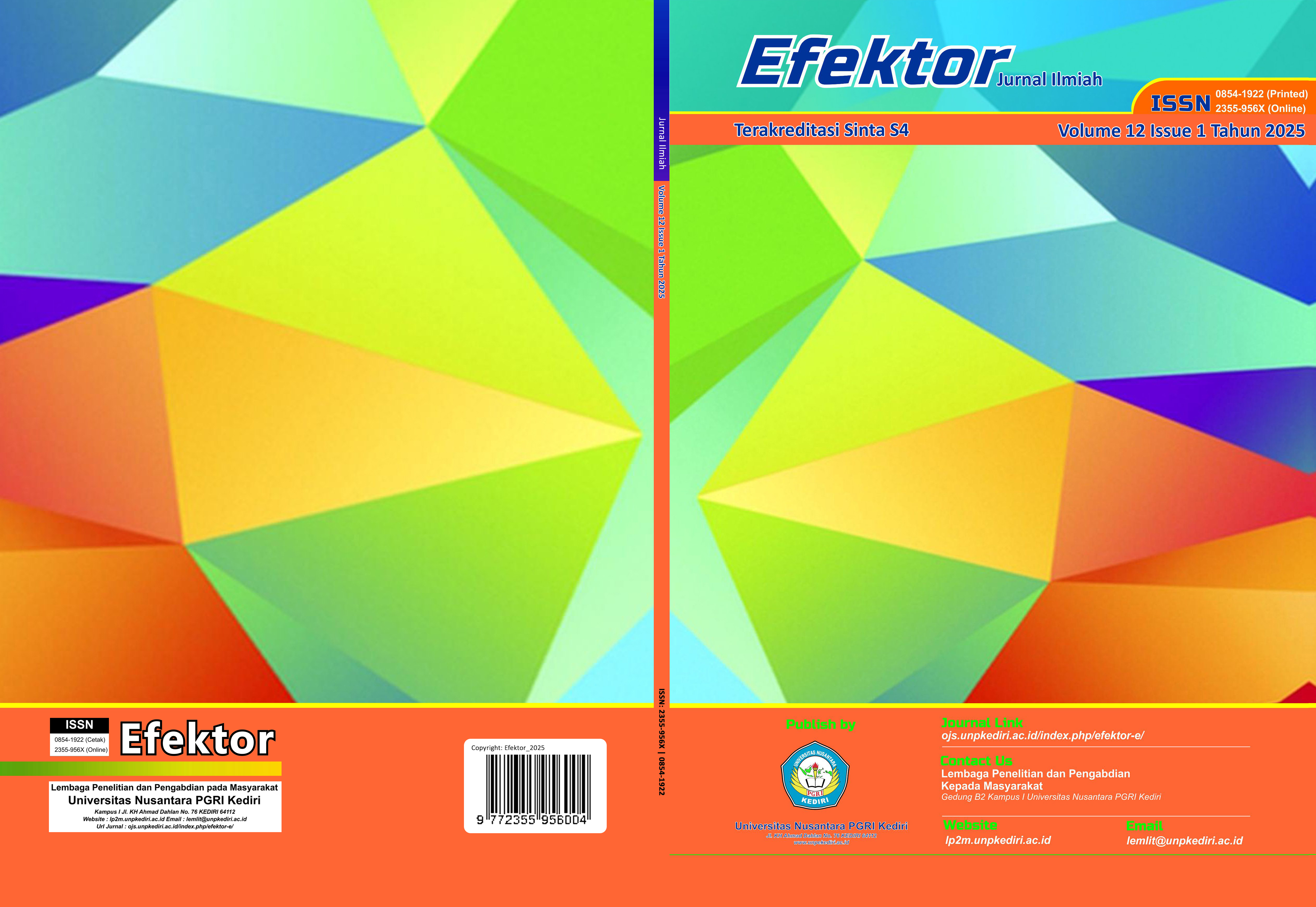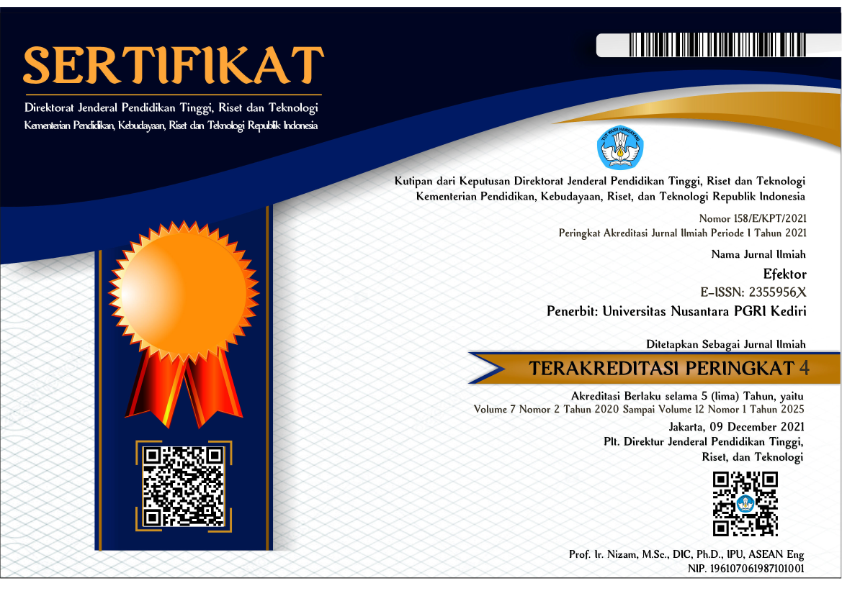Analysis of Factors Influencing Sleep Quality in Adolescents Using a Binary Scale
DOI:
https://doi.org/10.29407/e.v12i1.24850Abstract
Poor sleep quality in teenagers can cause negative psychological effects such as poor concentration and irritability, making teenagers feel sad, angry or stressed more than usual. The aim of this research is to identify factors that influence adolescent sleep quality, mainly related to sleep hygiene variables, sleep disorders, physical condition, and use of sleeping pills. The sample used in the research was 884 teenagers, using a cluster random sampling technique spread across several cities in East Java. The data analysis technique used is binary logistic regression to identify factors that influence the sleep quality of teenagers on a binary scale. The results of the research show that the factors that have a significant influence on the quality of sleep in adolescents are sleep hygiene, sleep disorders, physical condition, and partial or simultaneous use of sleeping pills. The model obtained shows that increasing sleep hygiene variables and physical condition increases the chances of good sleep quality. Sleep disorders and the use of sleeping medication show that an increase in these two variables can reduce the chances of good quality sleep. This means that in adolescents, interventions are recommended to focus on improving sleep hygiene, physical condition, reducing sleep disorders, and the use of sleeping medication, which can help improve the quality of sleep in adolescents significantly.
References
Agita, V, V., Widyastuti, N &Nissa, C. (2018). Asupan energi cemilan, durasi dan kualitas tidur pada remaja obesitas dan non obesitas. Journal Of Nutrition College, 7(3), 147-154. https://ejournal3.undip.ac.id/index.php/jnc/article/view/22280
Ali, R. M., Zolezzi, M., Awaisu, A., & Eltorki, Y. (2023). Sleep quality and sleep hygiene behaviours among university students in Qatar. International Journal of General Medicine, 2427-2439.
Aliah, A., Bachtiar, F., Agustiyawan, A., & Sirada, A. (2023). Relationship between physical activity and sleep quality in adolescents. Indonesian Journal of Health Development, 5(2), 102-108.
Alnawwar, M. A., Alraddadi, M. I., Algethmi, R. A., Salem, G. A., Salem, M. A., & Alharbi, A. A. (2023). The effect of physical activity on sleep quality and sleep disorder: a systematic review. Cureus, 15(8).
Amalia, Z. N. R., Fauziah, M., Ernyasih, Andriyani. (2022). Faktor-faktor yang berhubungan dengan kualitas tidur pada remaja tahun 2022. ARKESMAS, 7(2), 29-38.
Athiutama, A., Ridwan, R., Febriani, I., Erman, I., & Trulianty, A. (2023). Penggunaan media sosial dan kualitas tidur pada remaja. Jurnal Keperawatan Raflesia, 5(1), 57-64.
Auliyanti, F., Sekartini, R., & Mangunatmadja, I. (2015). Academic achievement of junior high school students with sleep disorders. Paediatrica Indonesiana, 55(1), 50-8.
Azzahra, A. A., Shamhah, H., Kowara, N. P., & Santoso, M. B. (2021). Pengaruh pola asuh orang tua terhadap perkembangan mental remaja. Jurnal penelitian dan pengabdian kepada masyarakat (JPPM), 2(3), 461.
Casavi, V., Shetty, S., Alva, J., & Nalini, M. (2022). Relationship of quality of sleep with cognitive performance and emotional maturity among adolescents. Clinical Epidemiology and Global Health, 13, 100958.
Chattu, V. K., Manzar, M. D., Kumary, S., Burman, D., Spence, D. W., & Pandi-Perumal, S. R. (2018). The global problem of insufficient sleep and its serious public health implications. In Healthcare, 7(1)I.
Fakhrurrozi, S. H., Afrina, R., & Rukiah, N. (2024). Hubungan prilaku sleep hygiene dengan kualitas tidur remaja usia 10-19 tahun Di RW06 Desa Cirimekar Kecamatan Cibinong tahun 2023. Jurnal Riset Ilmu Kesehatan Umum dan Farmasi (JRIKUF), 2(2), 38-48.
Febriana, I. S. (2020). Faktor-faktor yang mempengaruhi kualitas tidur pada remaja di Kota Palangka Raya (Doctoral dissertation, Poltekkes Kemenkes Palangka Raya).
Istanti, N., Antara, A. N., & Ernawati, Y. (2024). Faktor-Faktor yang mempengaruhi risiko obesitas pada remaja di Panti Asuhan Darun Najah Sleman Yogyakarta. Jurnal Keperawatan, 12(2), 206-2017.
Jeki, A. G., & Wulansari, A. (2023). Penguatan literasi tentang aktivitas fisik pada remaja sebagai upaya GERMAS di SMPN 5 Kota Jambi. Jurnal Mandala Pengabdian Masyarakat, 4(2), 423-429.
Kementerian Kesehatan RI. Pusat Data dan Informasi (Datin). (2014). Situasi kesehatan reproduksi remaja. http://www.depkes.go.id/resources/ download/pusdatin/infodatin/infodatin%20 reproduksi%20remaja-ed.pdf
Kuswanto. (2021). Hubungan durasi waktu bermain game online dengan kualitas tidur pada remaja di SMA Srijaya Negara Palembang tahun 2021. Sekolah Tinggi Ilmu Kesehatan Bina Husada.
Lanza, G., Ferri, R., Bella, R., & Ferini-Strambi, L. (2017). The impact of drugs for multiple sclerosis on sleep. Multiple Sclerosis Journal, 23(1), 5-13.
McCallum, S. M., Batterham, P. J., Calear, A. L., Sunderland, M., Carragher, N., & Kazan, D. (2019). Associations of fatigue and sleep disturbance with nine common mental disorders. Journal of Psychosomatic Research, 123, 109727.
National Library of Medicine. (2021). National library of medicine : MedlinePlus. https://medlineplus.gov/genetics/understanding/inheritance/familyhistory/
National Sleep Foundation. (2023). Mastering sleep hygiene: Your path to quality sleep. https://www.sleepfoundation.org/sleep-hygiene
Ningsih, D. S., & Permatasari, R. I. (2020). Faktor-faktor yang mempengaruhi kualitas tidur pada remaja di smkn 7 pekanbaru. Ensiklopedia of Journal, 2(2).
Nugraha, F. A., Aisyiah, A., & Wowor, T. J. (2023). Analisis faktor yang berhubungan dengan kualitas tidur pada remaja di SMPN 254 Jakarta. Malahayati Nursing Journal, 5(9), 3063-3076.
P2PTM Kemenkes RI. (2019). Sobat sehat, apakah kebutuhan tidur anda sudah terpenuhi?. https://p2ptm.kemkes.go.id/infographicp2ptm/stress/page/5/sobat-sehat-apakah-kebutuhan-tidur-anda-sudah-terpenuhi
Pinalosa, L., Dhawo, M. S., & Anggraini, S. (2018). Perbandingan kualitas tidur siswa/siswi kelas XI SMA negeri dengan kualitas tidur siswa/siswi kelas XI SMA swasta. Jurnal Keperawatan Suaka Insan (JKSI), 3(2), 1-17.
Purnama, N. L. A., & Silalahi, V. (2020). Efektifitas pendidikan kesehatan terhadap perilaku sleep hygiene dan kualitas tidur pada remaja dengan gangguan tidur. Jurnal Keperawatan Muhammadiyah, 5(1).
Putri, N. R., Dewi, K. T., Christiana, M. Y., Ramadhani, N., & Kusmawati, I. I. (2023). Edukasi dismenorea pada remaja sebagai upaya mengurangi ketidaknyamanan selama menstruasi. JMM (Jurnal Masyarakat Mandiri), 7(1), 350-359.
Rachmasari, K. A., Hartini, S., Kholisa, I. L., & Prabandari, Y. S. (2021). Hubungan antara stres dengan kualitas tidur remaja di balai perlindungan dan rehabilitasi sosial remaja Yogyakarta. Jurnal Keperawatan Klinis dan Komunitas (Clinical and Community Nursing Journal), 5(1), 48-60.
Raouf, N. R., & Fekry, C. M. (2024). Sleep quality and its associated factors among rural adults in Egypt: A community-based study. Minia Journal of Medical Research, 35(1), 55-64.
Savitri, K. A., Fitryasari, R., Zulkarnain, H., Tristiana, R. D., & Yusuf, A. (2021). The impact of smartphone uses on adolescent sleep quality during the COVID- 19 pandemic in Surabaya, Indonesia. The 2nd International Nursing and Health Sciences Symposium (INHSS). Malang: School of Nursing Faculty of Medicine Universitas Brawijaya.
Shinta, A. P., Jannah, N., & Rohmansyah, R. (2021). Pendampingan remaja di Kota Yogyakarta dalam upaya pencegahan konsumsi tinggi sugar sweetened beverages, obesitas, dan penyakit berisiko. Jurnal Abdidas, 2(6), 1263-1268.
Thurfah, J. N., Puspitasari, I. M., & Alfian, S. D. (2022). Suplemen untuk meningkatkan kualitas tidur. Farmaka, 20(2), 76-87.
World Health Organization. (2023). Practical guidance resource to operationalize the global consensus statement on meaningful adolescent and youth engagement (MAYE). World Health Organization.
Zhao, H., Lu, C., & Yi, C. (2023). Physical activity and sleep quality association in different populations: a meta-analysis. International journal of environmental research and public health, 20(3), 1864.
Downloads
Published
Versions
- 2025-04-22 (2)
- 2025-04-22 (1)
Issue
Section
License
Copyright (c) 2025 Siti Muntomimah, Syahrul Mubarok

This work is licensed under a Creative Commons Attribution-ShareAlike 4.0 International License.
Authors who publish with this journal agree to the following terms:
- Copyright on any article is retained by the author(s).
- The author grants the journal, the right of first publication with the work simultaneously licensed under a Creative Commons Attribution License that allows others to share the work with an acknowledgment of the work’s authorship and initial publication in this journal.
- Authors are able to enter into separate, additional contractual arrangements for the non-exclusive distribution of the journal’s published version of the work (e.g., post it to an institutional repository or publish it in a book), with an acknowledgment of its initial publication in this journal.
- Authors are permitted and encouraged to post their work online (e.g., in institutional repositories or on their website) prior to and during the submission process, as it can lead to productive exchanges, as well as earlier and greater citation of published work.
- The article and any associated published material is distributed under the Creative Commons Attribution-ShareAlike 4.0 International License













